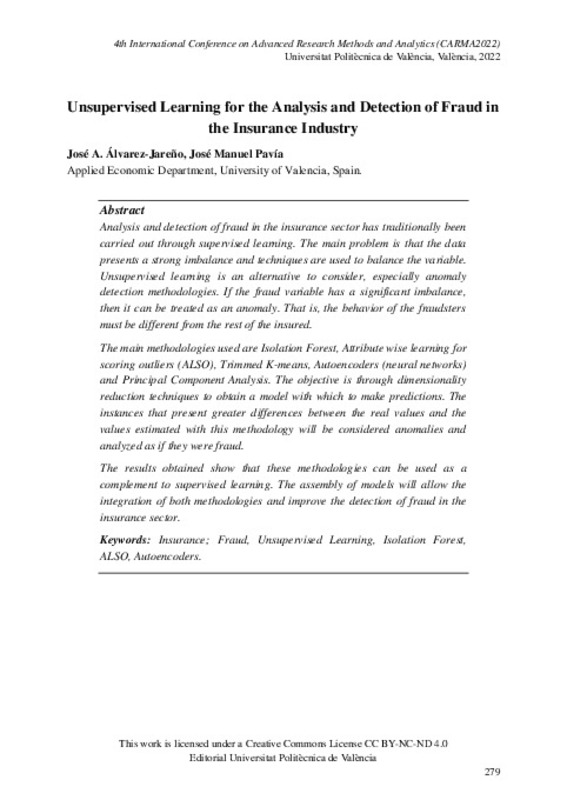JavaScript is disabled for your browser. Some features of this site may not work without it.
Buscar en RiuNet
Listar
Mi cuenta
Estadísticas
Ayuda RiuNet
Admin. UPV
Unsupervised Learning for the Analysis and Detection of Fraud in the Insurance Industry
Mostrar el registro sencillo del ítem
Ficheros en el ítem
| dc.contributor.author | Alvarez-Jareño, José A.
|
es_ES |
| dc.contributor.author | Pavía, José Manuel
|
es_ES |
| dc.date.accessioned | 2022-11-14T13:12:40Z | |
| dc.date.available | 2022-11-14T13:12:40Z | |
| dc.date.issued | 2022-09-20 | |
| dc.identifier.isbn | 9788413960180 | |
| dc.identifier.uri | http://hdl.handle.net/10251/189706 | |
| dc.description.abstract | [EN] Analysis and detection of fraud in the insurance sector has traditionally been carried out through supervised learning. The main problem is that the data presents a strong imbalance and techniques are used to balance the variable. Unsupervised learning is an alternative to consider, especially anomaly detection methodologies. If the fraud variable has a significant imbalance, then it can be treated as an anomaly. That is, the behavior of the fraudsters must be different from the rest of the insured.The main methodologies used are Isolation Forest, Attribute wise learning for scoring outliers (ALSO), Trimmed K-means, Autoencoders (neural networks) and Principal Component Analysis. The objective is through dimensionality reduction techniques to obtain a model with which to make predictions. The instances that present greater differences between the real values and the values estimated with this methodology will be considered anomalies and analyzed as if they were fraud.The results obtained show that these methodologies can be used as a complement to supervised learning. The assembly of models will allow the integration of both methodologies and improve the detection of fraud in the insurance sector. | es_ES |
| dc.format.extent | 1 | es_ES |
| dc.language | Inglés | es_ES |
| dc.publisher | Editorial Universitat Politècnica de València | es_ES |
| dc.relation.ispartof | 4th International Conference on Advanced Research Methods and Analytics (CARMA 2022) | |
| dc.rights | Reconocimiento - No comercial - Sin obra derivada (by-nc-nd) | es_ES |
| dc.subject | Insurance | es_ES |
| dc.subject | Fraud | es_ES |
| dc.subject | Unsupervised learning | es_ES |
| dc.subject | Isolation Forest | es_ES |
| dc.subject | ALSO | es_ES |
| dc.subject | Autoencoders | es_ES |
| dc.title | Unsupervised Learning for the Analysis and Detection of Fraud in the Insurance Industry | es_ES |
| dc.type | Capítulo de libro | es_ES |
| dc.type | Comunicación en congreso | es_ES |
| dc.rights.accessRights | Abierto | es_ES |
| dc.description.bibliographicCitation | Alvarez-Jareño, JA.; Pavía, JM. (2022). Unsupervised Learning for the Analysis and Detection of Fraud in the Insurance Industry. En 4th International Conference on Advanced Research Methods and Analytics (CARMA 2022). Editorial Universitat Politècnica de València. 279-279. http://hdl.handle.net/10251/189706 | es_ES |
| dc.description.accrualMethod | OCS | es_ES |
| dc.relation.conferencename | CARMA 2022 - 4th International Conference on Advanced Research Methods and Analytics | es_ES |
| dc.relation.conferencedate | Junio 29-Julio 01, 2022 | es_ES |
| dc.relation.conferenceplace | Valencia, España | |
| dc.relation.publisherversion | http://ocs.editorial.upv.es/index.php/CARMA/CARMA2022/paper/view/15024 | es_ES |
| dc.description.upvformatpinicio | 279 | es_ES |
| dc.description.upvformatpfin | 279 | es_ES |
| dc.type.version | info:eu-repo/semantics/publishedVersion | es_ES |
| dc.relation.pasarela | OCS\15024 | es_ES |






